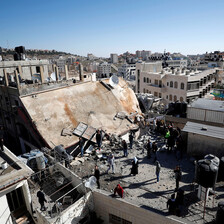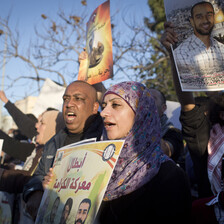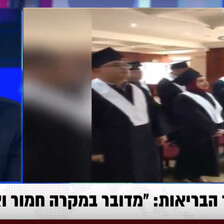The Electronic Intifada 12 April 2017
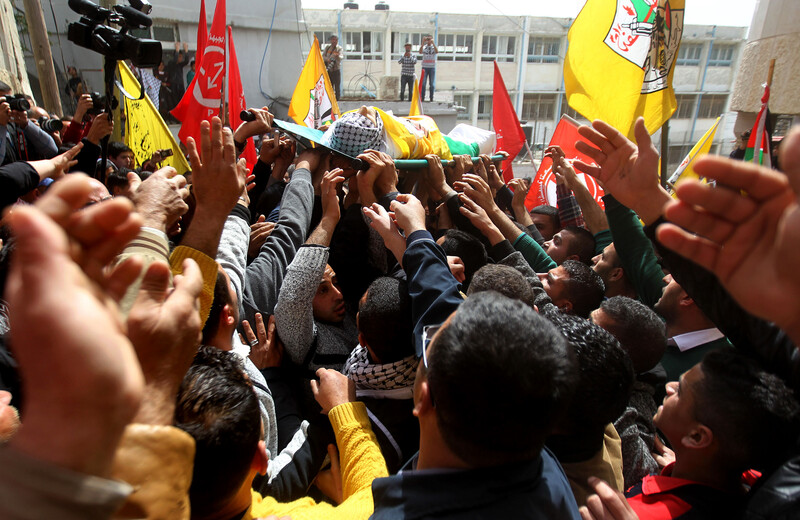
Arroub refugee camp residents bid a final farewell to Murad Abu Ghazai during his funeral on 18 March.
APA imagesSummoning deep patience is nothing new for Zeina Abu Ghazi.
She lives with her family in Arroub refugee camp, north of Hebron in the occupied West Bank. A refugee from Beit Jibrin, a Palestinian town ethnically cleansed by Zionist militias in 1948, located in what is today called Israel, Zeina is a mother of nine: six boys and three girls.
All six of her sons have been jailed by Israel over the last 15 years, mainly for stone-throwing and participating in clashes with Israeli occupation forces.
Visiting prisons can be an excruciating journey. For Zeina it has meant leaving home as early as 5 am, waiting for hours at checkpoints, and enduring invasive searches before entering the various prisons located throughout historic Palestine where Israel has locked up her sons. But that ordeal would instantly be forgotten once Zeina saw her boys.
“You have to be patient and resilient,” Zeina said. “God gives me the strength to continue and the patience to cope, and we mothers have no choice but to be patient.”
Zeina faces her greatest test yet after the death of her son Murad just a few days before his 17th birthday last month.
That day was supposed to be a happy one in Arroub camp. Residents were celebrating the release of Ismail Farrajin after 13 years of Israeli imprisonment.
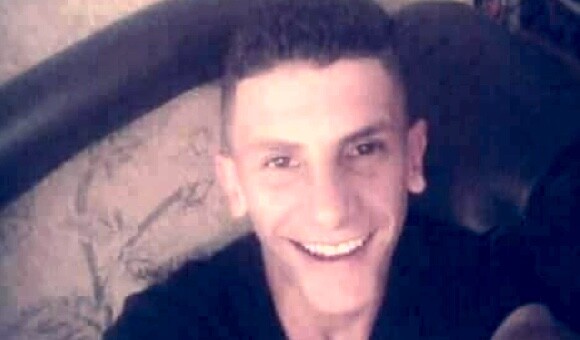
Murad Abu Ghazi (via Defense for Children International - Palestine)
Fridays are also known for regular confrontations between camp youth and Israeli soldiers. Arroub is one of the most frequently raided camps in the West Bank, according to UNRWA, the United Nations agency for Palestine refugees.
Murad, still not fully recovered from a car accident that left him with a broken leg, joined the youth to throw rocks and Molotov cocktails at an Israeli military post near the camp. The Israeli army ambushed the youth, firing live bullets at them from close range.
A coroner found that Murad was hit with a bullet in his left shoulder, which pierced his heart before exiting his chest. He likely died within minutes of being struck.
Another teen was hit in the chest with a live bullet and was left in moderate-to-critical condition.
“At first we were told that Murad was injured and that another guy was killed,” Akram Abu Ghazi, Murad’s 33-year-old brother, told The Electronic Intifada.
“I drove to al-Ahli hospital in Hebron where Murad was transferred. I cannot describe to you the shock we all felt when the doctors said that Murad was dead. I did not know how to pass the news to my parents.”
Pride
It was only after Murad’s death that his parents found out that he frequently attended protests and took part in confrontations with the Israeli army week in, week out.
“Yes, I am proud of him, especially when I hear from his friends about his courage and determination,” Zeina said. “But I wish I could have stopped him from going, because every mother wants to protect her children first and foremost.”
Yet Murad was too stubborn, never shying away from the front lines, never heeding his older brothers’ advice to be more cautious.
His friend Ahmad recalled that Murad insisted on taking the cast off his broken leg himself without consulting the doctor.
“He was so active and energetic and couldn’t stay put,” said Ahmad. “The thing that really annoyed him when he broke his leg was that he couldn’t be with us during the clashes with the army.”
The year 2016 was particularly rough for Murad.
In February, his close friend and classmate Omar Madi Jawabreh, 15, was killed by Israeli occupation forces when a bullet hit him in the chest.
Clashes had broken out after the army invaded Arroub and camp youth responded with a barrage of rocks. Murad was among those confronting the soldiers that day when Omar was shot before his eyes.
“Omar’s martyrdom affected Murad deeply, it changed him,” Zeina said. “He visited Omar’s grave every day and wore his necklace. He kept Omar’s picture in his pocket and always visited his mother and was like a son to her.”
Friends of Palestinian martyrs, including young teenagers, spontaneously form networks of support around bereaved families. This is particularly true in Arroub, home to approximately 1,000 refugees, where community ties are strong. Murad and his friends sought to make up for the loss of Omar by remaining close to his family and treating his mother like their own.
Imprisoned by Israel
The following September, Murad was arrested when he had just been released from hospital where he was receiving treatment for severe abdominal illness. Murad was arrested along with his cousin Muhammad. He was charged with stone-throwing and spent three months in jail.
“Even after his release, he was not happy and we felt that something inside him had changed,” Rana, Murad’s sister, told The Electronic Intifada. “It hurt him that he was released while Muhammad remained in prison. He kept saying that he wanted to go back to jail in order not to leave Muhammad alone.”
Murad dropped out of school and instead opted to work with his uncle in construction and was planning to start a career as a plumber.
Like most boys in the camp, Murad loved playing football and his brother said he was a big fan of FC Barcelona.
“Wherever he goes, he fills the place with happiness,” Akram said. “For many in the camp, Murad is a resistance hero. But for us, he will always be remembered as the kid who made everyone around him laugh from the depth of their heart.”
Murad’s father, Yousif, is profoundly devastated by the loss of his son. Almost completely deaf, Yousif has had nervous breakdowns since Murad’s killing.
“He wakes me up in the middle of the night and screams Murad’s name,” Zeina said. “I tell him that Murad is in heaven now and he says, crying, that he just wants him back home.”
Arroub camp paid Murad an emotional farewell, one that will live on in the memory of his family and friends.
“The whole camp participated in the funeral,” said Murad’s friend Ahmad. “Men, women and children. Everyone here loved Murad. My head will always be held high because he was my friend.”
Zeina had one big dream for Murad.
“I always prayed to live long enough in order to see Murad married and to hold his children in my arms,” she said. “But he had something more important to do: he sacrificed his life to defend the camp.”
Budour Youssef Hassan is a Palestinian writer based in Jerusalem. She blogs at budourhassan.wordpress.com.
